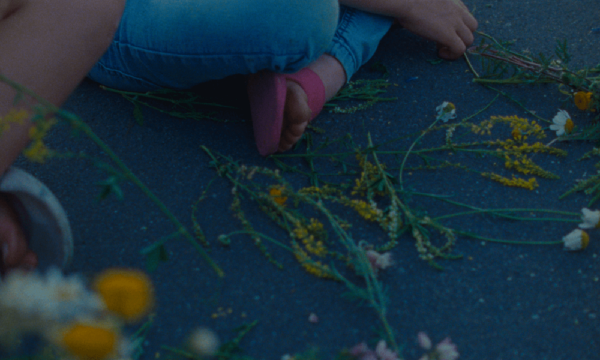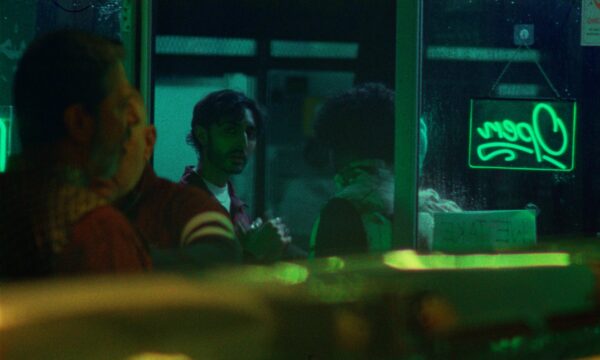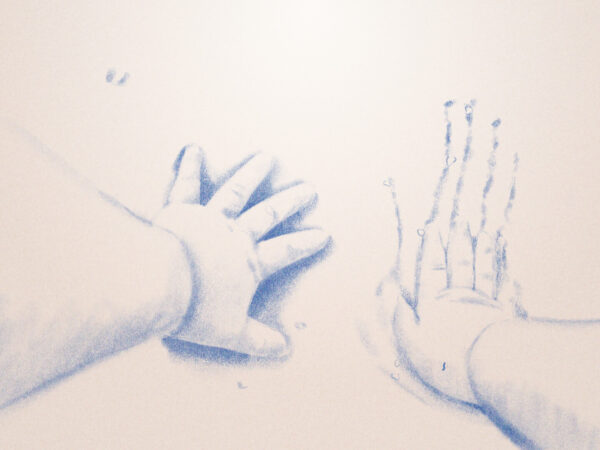A Gentle Farewell
Dad’s Sneakers
Through a thirteen-year-old boy’s minimalist story and point of view, Dad’s Sneakers resonates with worldwide sympathy for a country and people whose integrity is currently under attack.

Watching a Ukrainian film without relating it to the ongoing war is impossible. Dad’s Sneakers by the young filmmaker Olha Zhurba—Jury Prize winner and EFA candidate at Leuven Short Film Festival, currently in competition at Tampere Film Festival, part of Glasgow Short Film Festival later this month, and been made available to stream in Switzerland by Locarno Film Festival as part of a charity mission—succeeds to bring us further beyond the topicality, while inevitably evoking associations with the present crisis. Through a thirteen-year-old boy’s minimalist story and point of view, the film unintentionally resonates with worldwide sympathy for a country and people whose integrity (both physically and spiritually) is currently being attacked—a nostalgic take on a state that might never wake up again in the same world as the one that its citizens used to know, just like the film’s main character.
In the opening scene, bathed in aseptic light, cold-bloodedly shot through a peeping viewpoint and with a more narrow aspect ratio which differentiates it from the rest of the film, nervously giggling and barely talking Sasha is sitting at a table, opposite an English-speaking woman who is trying to ease the atmosphere by giving him a little plastic Ukrainian doll cat. An immense language abyss stretches between them: he does not speak English, nor does she speak Ukrainian. Via flashbacks, the immediate prehistory of the scene is unveiled, as we get a snapshot of Sasha’s former life, painted in a tender, sunny palette but filled with tension. Those are the last hours he’s spending in an orphanage for adolescents in his native Ukraine, before being delivered to his new mum, who will take him to his new home across the Atlantic. Forever.
Shaken by the fateful situation, he’s wandering around in his white embroidered shirt, unwilling to learn by heart the barely comprehensible welcoming speech for his adopter, written by someone else in his soon-to-be “mother tongue”. We follow Sasha in his desperate attempt to delay the looming farewell of the dazzling green overgrown grass of his homeland; of his cocky mates who mock and bully him (but at least he fully understands their intentions); of his dad, though he hangs up the phone when Sasha tries to reach out. Of the world and the humans he’s familiar with, no matter how hostile they might have been with him, of the cultural environment that raised him, no matter how insecure he grew. Physical departure is possible only with a special amulet: a symbolic connection with his past and origins, which will help him leave without falling apart, or at least for some part.
Some short films can feel like a feature, not because they are tedious to watch but rather for their rich post-screening effect, which gives rise to extensive elaborations after the final credits. Olha Zhurba’s 19-minute-long debut leaves an aftertaste of a multi-layered feature film: a fable charged with deep emotions that hosts the seeds of various parallel narratives which might grow and cross roots through the otherwise uncomplicated plotline. And since no firm answers are provided, the viewers’ associative imagination begins to flow.
The upper-level narrative is unfolded by the authentic portrait of an abandoned and love-deprived kid, trembling in his uncertainty about the place he occupies. How did the boy end up as an orphan, though he appears to have an alive father? What happened to his mother? Was his abandonment a result of a previous armed conflict in Ukraine, or is it a mere failure of parenthood? Bohdan Zenchenko, as Sasha, truthfully transmits the complexity of his character’s disruptive feelings. More than that, his intuitive talent evokes identification on a universal level that connects the spectator with Sasha’s inner self, beyond the concrete situation featured in the film.
Underneath all that, we find social commentary. The film paints a picture of a society that is willingly sending its children away to restart their lives with no option for a step back, further nurtured by the popular image of Ukraine as an international surrogacy hub. The decisive voice of the boarding school supervisor, who behaves as if executing a routine task on default and, unquestionably for Sasha’s good, not only transmits the message that Sasha is unwanted but also that the state cannot bear responsibility for him. Once banished by his family, he’s expelled for a second time: by his homeland—a predestined human condition for many post-Soviet people finding themselves orphaned by their own countries due to political or economic reasons.
The story’s strong connection to the subject of personal and national self-identification is where the film excels. Being a teenager with all the fragility this shaping age suggests, Sasha is about to face a drastic cultural shift before establishing a first understanding of who he is. We can only surmise his anxiety while trying to imagine an upcoming life in a context he does not have a clue about. In this regard, Dad’s Sneakers is a dramatic and heartbreaking poem on parting with one’s childhood, language, and identity. The mild-toned images of nature and the sunlit interiors embody the sweet recollections that will stay in Sasha’s sensorium, bathed in nostalgic tones and sealed in his memory for when he will be out of touch with this reality. Those captions of his coming-of-age personal time and space will remain encapsulated in his consciousness only and, if his integration is successful, will be sublimed into the subconscious.
Since the way we perceive film is greatly impacted by what’s on our mind, one cannot help but think about Sasha and Ukraine simultaneously. Like the boy, Ukraine is on its own right now and needs to mobilise its strength to face an unknown future. In this sense and context, Dad’s Sneakers could also be recognised as a gentle tribute to Ukraine’s sunnier days.





There are no comments yet, be the first!